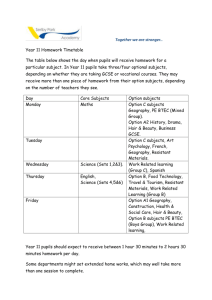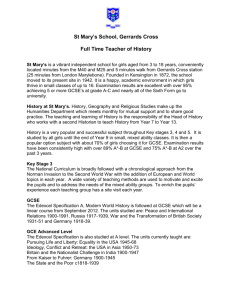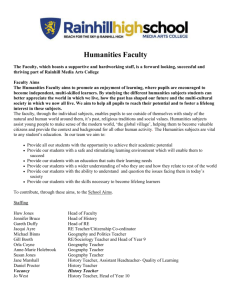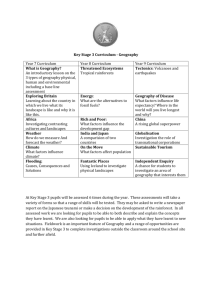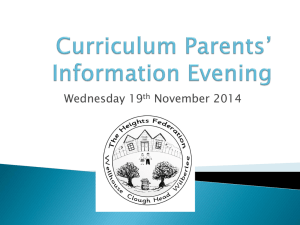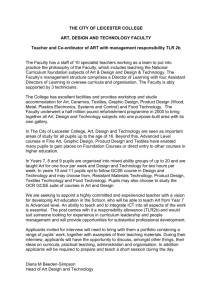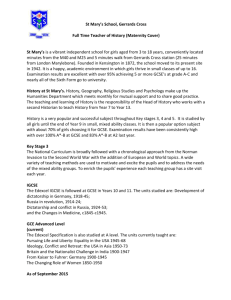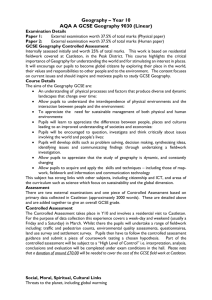THE HUMANITIES DEPARTMENT
advertisement
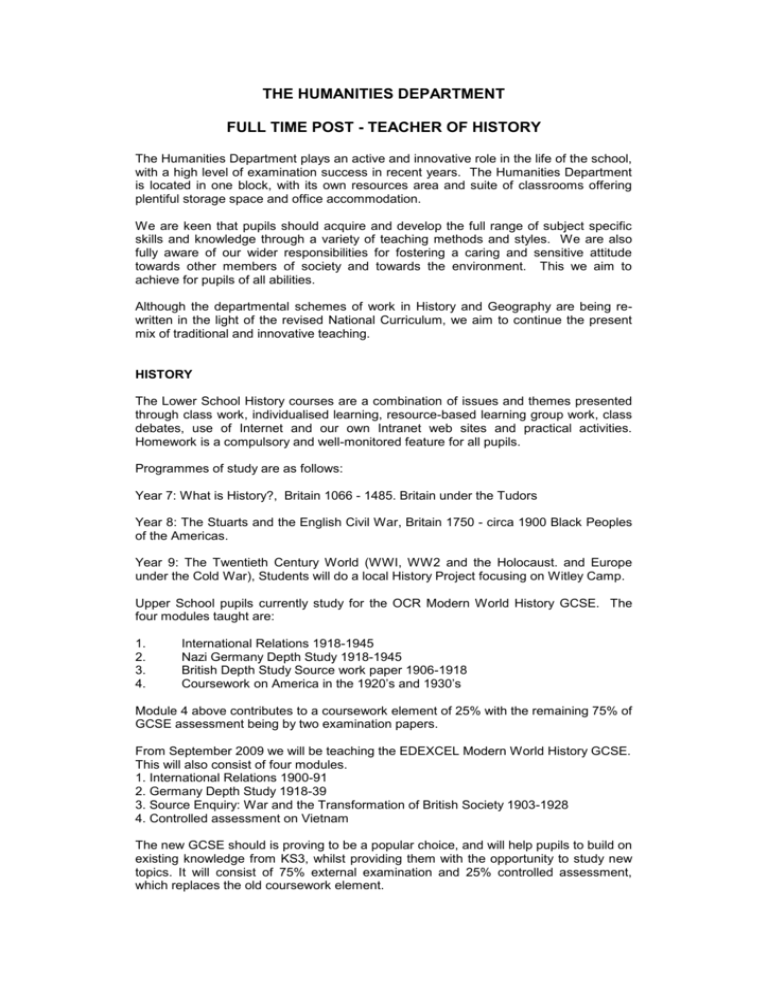
THE HUMANITIES DEPARTMENT FULL TIME POST - TEACHER OF HISTORY The Humanities Department plays an active and innovative role in the life of the school, with a high level of examination success in recent years. The Humanities Department is located in one block, with its own resources area and suite of classrooms offering plentiful storage space and office accommodation. We are keen that pupils should acquire and develop the full range of subject specific skills and knowledge through a variety of teaching methods and styles. We are also fully aware of our wider responsibilities for fostering a caring and sensitive attitude towards other members of society and towards the environment. This we aim to achieve for pupils of all abilities. Although the departmental schemes of work in History and Geography are being rewritten in the light of the revised National Curriculum, we aim to continue the present mix of traditional and innovative teaching. HISTORY The Lower School History courses are a combination of issues and themes presented through class work, individualised learning, resource-based learning group work, class debates, use of Internet and our own Intranet web sites and practical activities. Homework is a compulsory and well-monitored feature for all pupils. Programmes of study are as follows: Year 7: What is History?, Britain 1066 - 1485. Britain under the Tudors Year 8: The Stuarts and the English Civil War, Britain 1750 - circa 1900 Black Peoples of the Americas. Year 9: The Twentieth Century World (WWI, WW2 and the Holocaust. and Europe under the Cold War), Students will do a local History Project focusing on Witley Camp. Upper School pupils currently study for the OCR Modern World History GCSE. The four modules taught are: 1. 2. 3. 4. International Relations 1918-1945 Nazi Germany Depth Study 1918-1945 British Depth Study Source work paper 1906-1918 Coursework on America in the 1920’s and 1930’s Module 4 above contributes to a coursework element of 25% with the remaining 75% of GCSE assessment being by two examination papers. From September 2009 we will be teaching the EDEXCEL Modern World History GCSE. This will also consist of four modules. 1. International Relations 1900-91 2. Germany Depth Study 1918-39 3. Source Enquiry: War and the Transformation of British Society 1903-1928 4. Controlled assessment on Vietnam The new GCSE should is proving to be a popular choice, and will help pupils to build on existing knowledge from KS3, whilst providing them with the opportunity to study new topics. It will consist of 75% external examination and 25% controlled assessment, which replaces the old coursework element. The department has a good stock of textbooks, some issued to pupils. These are used in conjunction with a wealth of materials provided by staff. All History classrooms have their own interactive whiteboard. The successful candidate would be expected to contribute fully in this direction and take specific responsibility for agreed areas of the curriculum. Considerable video and DVD material is also available to all members of the department and is specifically geared to the modules taught. There is scope for the successful candidate to develop their own interests within the Department. Above all the candidate should be prepared to work effectively as part of a team. The department has a strong commitment to History beyond the classroom. Recent excursions have included a Battlefields trip for Year 9 and trips to Berlin for our GCSE students. GEOGRAPHY The Lower School Geography courses are a combination of issues and themes presented through classwork, individualised learning, resource-based learning including our own Intranet web sites, group work, class debates, practical activities and field work. Homework is a compulsory and well-monitored feature for each of the "banded" classes. Programmes of study are as follows: Year 7: What is Geography? Weather and Climate, "Extreme Weather" Project, Map Skills and Local Area (to include practical mapping skills), Settlement, Ecosystems and Case Study of Tropical Rainforests. Year 8: Tectonic processes, an introduction to Europe and the EU, a study of Italy (to include a comparison of two contrasting regions), Environmental Issues, Energy Investigation, Population and Transport study (with ICT link). Year 9: Study of an economically more developed country (Japan), Economic Activities, Employment structures and industrial location case study, Geomorphological processes (including rivers and/or coasts), Natural vegetation case study hot deserts project, Study of LEDC: Kenya (to include an assessment of the impact of tourism). In the Upper School, pupils opting for Geography follow the AQA GCSE Syllabus A. Assessment is by two examinations (75%) and a Local Geographical Enquiry (25%). The latter consists of a local investigation set as a Hypothesis Test with pupils able to choose a topic for research, which must involve fieldwork. Two written examinations will be taken: Written Component 1 - 40% of total assessment - 2 hours SECTION A: Examines skills related to Ordnance Survey mapwork, photographs, sketch maps, cross-sections and other resources. SECTION B: Physical Geography with candidates answering three from seven resource-based questions. Written Component 2 - 35% of total assessment - 2 hours Human Geography with candidates answering three from six resource-based questions. Section B: Written Component 1 topics: Tectonic Activity, Rocks and Landscapes, Rivers, Ice, Coasts, Weather and Climate, Ecosystems (three of these topics). Written Component 2 topics: Population or Settlement, Agriculture or Industry, Resource Management or Development. In recent years, the department has become well resourced, teamwork has been firmly established and a high level of examination passes achieved. The use of ICT has expanded rapidly in recent years and the department makes considerable use of the school's two bookable suites of 30 computers each and other IT rooms when available. EXTRA CURRICULAR ACTIVITIES There is a wide range of clubs and societies in the school where staff are involved. This is seen as an important aspect of the life of the school. In many cases this allows staff to work with pupils more informally and sometimes in areas other than their academic specialism. The History Club is one of the largest in the school and pursues a varied programme which includes regular excursions to places of historic interest. THE POST We are seeking to appoint an enthusiastic teacher of History and Geography. The successful candidate will be responsible to the Head of Department within the following main areas: To prepare and teach lessons to National Curriculum and GCSE requirements. To set and mark homework. To assess work to National Curriculum criteria, to record these assessments in an agreed form and to report this and other information to parents and within the school’s reporting cycles. To follow existing good practice within the department, in particular the use of resource-based learning and the integration of information technology skills within schemes of work. To work co-operatively as part of a team and take responsibility for delegated departmental tasks. To teach across the full ability range (both in supporting and guiding pupils with learning problems and in extending the very able). To empathise with young people and show the ability to enthuse and encourage a study of the past. To show high professional standards which support school standards in areas such as marking, homework and discipline. Additionally To act as form tutor and contribute fully to the tutorial programme within a year team. The successful candidate will be appointed at the relevant point of the standard scale together with the London Fringe Allowance.
